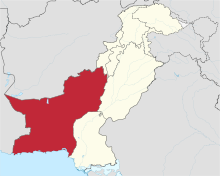Human rights violations in Balochistan
| Human rights violations in Balochistan | |
|---|---|
 |
|
| Location | Balochistan |
| Date | Ongoing |
| Target | Civilians and combatants |
| Perpetrators | Pakistani security forces Baloch separatist groups |
| Motive | Military clampdown |
Human rights violations in the Balochistan province of Pakistan have drawn concern and criticism in the international community, being described by Human Rights Watch (HRW) as having reached epidemic proportions. The violations have taken place during the ongoing Balochistan conflict between Baloch nationalists and the Government of Pakistan over the rule of Balochistan, the largest province by land area of modern-day Pakistan.
Brad Adams the director of the Asia branch of HRW has said that the Pakistani government has not done enough to stop the violence, which include torture, enforced disappearances of those suspected of either terrorism or opposing the military, ill treatment of those suspected of criminal activity, and extrajudicial killings.Marc Tarabella, the vice-chair of the European Parliament's delegation for relations with the countries of Southeast Asia and the association of Southeast Asian nations (ASEAN), has called reports of the human rights situation "alarming" and stated that the "main victims" of the violence are Balochistanis who "are being systematically targeted by paramilitary groups, allegedly sponsored by the Pakistani authorities."
Violations have a fairly low profile in Pakistan. According to Declan Walsh in The Guardian newspaper, "newspaper reports" in Pakistan about civilian killings in Balochistan are "buried quietly on the inside pages, cloaked in euphemisms or, quite often, not published at all". Journalist Ahmed Rashid writes that "so many journalists have been killed in Balochistan" that "journalists are too scared" to cover the issue.
Before joining Pakistan, Balochistan consisted of four princely states: Makran, Las Bela, Kharan, and Kalat. Three of these, Makran, Las Bela, and Kharan willingly joined Pakistan in 1947 during the dissolution of the British Indian Empire. However, Kalat, led by the Khan of Kalat, Ahmed Yaar Khan, chose independence as this was one of the options given to all of the princely states by Clement Attlee at the time. In April 1948, however, Pakistan deployed armed forces to Kalat, and the Khan was forced to accede to Pakistan. The Khan's brother Prince Kareem Khan declared independence and fled to Afghanistan to seek aid and begin an armed struggle that failed. By June 1948, Baluchistan in whole became a region of Pakistan.
...
Wikipedia
